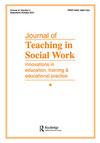实地指导:促进社会工作学生积极职业认同的关系模式
IF 0.9
Q3 EDUCATION & EDUCATIONAL RESEARCH
引用次数: 0
摘要
社会工作专业认同的培养是社会工作教育的一个重要内容。目前尚不清楚社会工作项目的学生是如何发展这种身份的;它的发展似乎依赖于各种学习经验的整合,以及课堂和实地作业中对课程内容的接触。教师和实地教官在这一过程中发挥着重要作用。在本文中,作者认为,积极的专业社会工作认同可以通过与导师在实地工作监督中的关系来培养。利用Kohut的自我心理学理论,作者提出了一个强调自我客体需求概念在现场师生关系中的应用的模型。他的理论的中心前提之一是,个体从童年到成年都内化了自我客体提供的经验,以满足自我的情感需求。作者建议实地教师提供自我客体体验,以维持和促进社会工作学生在培训中的积极职业认同的发展。该模型的应用强调了学生在社会工作专业发展过程中的情感变化。本文章由计算机程序翻译,如有差异,请以英文原文为准。
Field Instruction: A Relational Model to Promote A Positive Professional Identity for Social Work Students
ABSTRACT The development of a social work professional identity is an element of social work education. It is not clear how students in social work programs develop this identity; its development seems to be dependent on the integration of various learning experiences and exposure to curriculum content in the classroom, and in the fieldwork assignments. Teachers and field instructors play important roles in this process. In this paper, the authors argue that a positive professional social work identity can be fostered through the relationship with instructors in fieldwork supervision. Using Kohut’s theory of Self Psychology, the authors present a model that highlights the application of the concept of self-object needs to the field instructor-student relationship. One of the central premises of his theory is that individuals from childhood and throughout adulthood internalize the experiences provided by self-objects to meet the emotional needs of the self. The authors propose that field instructors provide self-object experiences that can sustain and foster the development of a positive professional identity for social work students in training. The application of this model underscores students’ affective changes associated with students’ professional development in social work programs.
求助全文
通过发布文献求助,成功后即可免费获取论文全文。
去求助
来源期刊

Journal of Teaching in Social Work
EDUCATION & EDUCATIONAL RESEARCH-
CiteScore
1.20
自引率
0.00%
发文量
36
期刊介绍:
The Journal of Teaching in Social Work fills a long-standing gap in the social work literature by providing opportunities for creative and able teachers—in schools, agency-based training programs, and direct practice—to share with their colleagues what experience and systematic study has taught them about successful teaching. Through articles focusing on the teacher, the teaching process, and new contexts of teaching, the journal is an essential forum for teaching and learning processes and the factors affecting their quality. The journal recognizes that all social work practitioners who wish to teach (whatever their specialty) should know the philosophies of teaching and learning as well as educational methods and techniques.
 求助内容:
求助内容: 应助结果提醒方式:
应助结果提醒方式:


